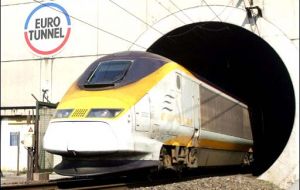MercoPress. South Atlantic News Agency
Eurostar sets record on Paris-London inaugural journey
 A Eurostar train emerging from the Channel Tunnel in Calais
A Eurostar train emerging from the Channel Tunnel in Calais Eurostar has set a record on its inaugural journey from Paris to London via Britain's new high-speed line. The train, carrying journalists and VIPs, arrived at St Pancras, instead of Waterloo, for the first time. It took two hours, three minutes, 39 seconds.
The 68-mile line is expected to help cut Paris to London journey times by 20 minutes to two hours, 15 minutes, when it opens to the public on 14 November. Construction of the line and revamping St Pancras cost £5.8bn (6 billion US dollars) in public funds. The high cost of the project is partly due to some major engineering challenges, including laying track to pass over the River Medway, under the River Thames and through 11 miles of tunnels beneath London. The train left central Paris at 0944 BST. The BBC's Nick Higham, on board the train, said a GPS device had recorded a speed of 202mph (325km/h) in France and 195mph in Britain. Trains will normally reach speeds of up to 186mph in Britain. The train joined the new 68-mile (110km) line, known as High Speed 1, at the Channel Tunnel near Folkestone, before arriving at St Pancras International at about 1148 BST. It passed through the new £100m Ebbsfleet International station near Dartford, in Kent. Ben Ruse, of London and Continental Railways, the company behind the new line, said: "It's an absolute milestone in the history of rail travel in the UK." It was a combination of the power of the train and "top-notch, specific engineering" of the track that had enabled the train to travel at the same speed on the continent and in the UK, he said. Seven services to Paris and five to Brussels will start running from Ebbsfleet from 19 November and a ticket office has been opened at Bluewater Shopping Centre two miles from the station. Eurostar trains have always traveled along the French section of the route at high speeds, but were forced to slow down on the British side because they shared a track with commuter services in and out of London. Richard Brown, chief executive of Eurostar, said he hoped that by 2010 10m people would travel by Eurostar each year. "Today marks Britain's entry into the European high-speed rail club." He said journey times to Paris, even for people traveling from Yorkshire, would be broadly the same as for those flying due to lengthier check-in times at airports. "It's as quick and more frequent... and we will be matching airline prices." Nigel Harris, managing editor of Rail Magazine, said he was thrilled to be among the first passengers to travel on the new high-speed line. He said it would mean hundreds of thousands of people from north of London would be able to travel to Paris without facing the drag of traveling across London on bus, Tube or train to get to Waterloo. Critics though say that unless passengers start their journey in London, the cost of rail travel to reach St Pancras is prohibitive. But Mr Brown told BBC News 24 negotiations were under way with train companies which operate north of London to put in place "attractive through-fares" from Yorkshire, Scotland and the Midlands to Paris and Brussels. Eurostar tickets from London to Paris start from £59 return. London and Continental Railways said it was the first new railway for 100 years and Britain's largest single construction in history. Mr Ruse, of LCR, said it would be a "very powerful catalyst" for regeneration. He said LCR had a commitment to repay some of the £5.8bn in government money from profits generated from large areas of land bought around the track. Of the funding, £800m went on redeveloping St Pancras station, meaning the cost of installing the line was about £73.5m per mile. This compares with £28.4m to build a mile of a three-lane motorway in 2005, according to a Parliamentary answer from May last year. St Pancras station will eventually be linked to the site of the 2012 Olympics at Stratford, east London. (BBC).-




Top Comments
Disclaimer & comment rulesCommenting for this story is now closed.
If you have a Facebook account, become a fan and comment on our Facebook Page!